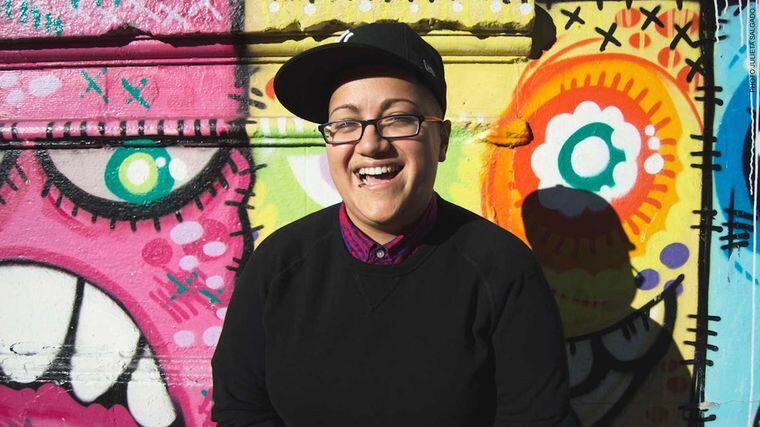Before she wrote Marvel Comics' first series to feature a queer, Latin American superhero, Gabby Rivera wrote short stories for anthologies about queer life in Portland.
Shortly after she came out to her family, Rivera spent a few formative years living in Portland. She's since moved back to her hometown of New York City, but she channeled her experiences as a 19-year-old living in Portland in the early 2000s into her first book, a young adult novel called Juliet Takes a Breath.
The coming-of-age story was first published in 2016 via e-book-centric publisher Riverdale Avenue Books. Rivera's next release was on a much wider platform. From 2017 to 2018, she penned Marvel's America, about superhero America Chavez and her adventures to protect Earth.
Now, Juliet Takes a Breath is about to be re-released by publishing giant Penguin Random House. The book follows Juliet Milagros Palante, who moves to Portland from the Bronx almost immediately after coming out of the closet. In Portland, Juliet learns crucial lessons about herself while falling in love—and growing disillusioned—with Portland's mostly white weirdos.
Before her re-release book tour stops at Powell's, WW talked to Rivera about Juliet gaining a new audience, family dynamics, and stories about queer characters with happy endings.
WW: Juliet feels like a really well fleshed-out character in Juliet Takes a Breath. How much of her is based on your experiences?
Gabby Rivera: The story of Juliet Takes a Breath, where a young Puerto Rican girl from the Bronx falls in love with a book, essentially, about feminism and goes to Portland, Oregon—I did that. But Juliet herself is different from me in the sense that I let her be more outwardly vocal about being messy and confused. I hide some of those things. I try to hide sometimes when I'm confused.
A couple of recurring themes I've noticed are loyalty and communication. Specifically, Juliet's family seems very loyal to her, although they might not necessarily accept or understand her identity.
Number one, with Juliet Takes a Breath I wanted to offer a different narrative for queer kids of color, one where we not only survive but we thrive. A lot of LGBTQ storylines and movies, the parents are like, "You're out of here! I cannot accept this! Get the hell out!" and that's real. Listen, LGBTQ youth make up the largest population of kids on the street, so that is all reality, for sure.
And then there's also stuff that's more of what I experienced. My dad had gay people in his family, so he wasn't happy about it, but he was like, "Well, it is what it is." And my mom, she was wrecked by me coming out, but at the same time, she was like, "I'm your mother, I love you no matter what, this is your house, I'm going to continue to love you, nothing you could ever do would make me stop loving you." Those are my parents, and they kept their love on the table.
When I've done LGBTQ youth advocacy work, one of the things we're learning is just keeping that love on the table is enough to save the life of your kid and save the lives of other young people in your world. So in Juliet's world, I really wanted to see her parents keep that love on the table.
It just makes me think about my own family dynamics, too: older generations not talking about certain things, and then with Juliet, too, she has all these thoughts, has all these reactions she wants to give—
And she gets frozen and stuck, and that's so real too, because we're taught that the loudest person and the person who speaks first is the one that everyone listens to, and that doesn't leave a lot of room for the rest of us. And that's me, too. I'm that person where I'm in the moment, something happens, and I go blank, I get anxious, and later on I think of all the things I could've said. And so Juliet, when it comes to being a young Latina, all we ever see—and lovingly, I love all the loud Latinas that got each others' backs and can say those things at the drop of a dime, I love that. And also, there are girls like Juliet, who are just kind of like, "Uh, I don't like this, I don't know what's happening, I can't even talk, I want to like run and figure this out on my own."
Obviously, with getting the book republished, we see the story exposed to a wider audience, there's the potential for more income, but what else does the re-release mean for us?
I feel like Juliet Takes a Breath has these wings. She keeps flying and she's doing it off the strength of connections she's making with communities, where it's like Latina Puerto Rican girl from the Bronx but the ripple out from the Latinx queer community. So it being republished is, yo, look at the strength of all these communities coming together, like the manifestation of every queer blogger that ever wrote about me in the beginning, or every homie that bought a copy of the original version and donated so I could send a copy to an LGBTQ youth center. Being republished shows how the community can shift a major publisher and get a book to get that attention, so to me, it's like, look at what you can do when you finish your projects and let people love you, to let your truth out into the world.
SEE IT: Gabby Rivera reads at Powell's at Cedar Hills Crossing, 3415 SW Cedar Hills Blvd., Beaverton, powells.com, on Wednesday, Sept. 18. 7 pm. Free.

Where to See Local Jazz Every Night of the Week
The Five Book Events We're Most Excited to See This Fall
The Five Theater Shows We're Most Excited to See This Fall
The Five Visual Arts Shows We're Most Excited to See This Fall

